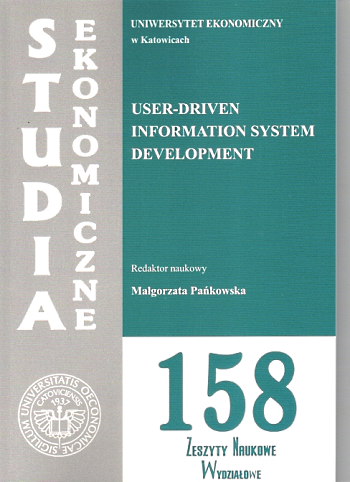
Publisher: University of Economics in Katowice (2013)
162 pages
ISSN 2083-8611
User-Driven Information System Development
Studia Ekonomiczne Zeszyty Naukowe 158
Malgorzata Pankowska (ed.)
In data management, the needs of the underlying technology appear most demanding: choosing appropriate data formats, schema, or importing data from heterogeneous sources into consistent databases. However, in the best interest of the software provider, users can't be perceived as an inconvenience, as people who may enter incorrect or inconsistent data, and, therefore, should be protected against. A user-driven approach puts people at the heart of information system design. This is not just about the aesthetics of the screens of a nice interface for user, but it permeates every aspect of the design of a system.
In business information system domain, end-users have an opportunity to improve, modify, determine the final form of product in such a way that satisfies the needs and expectations. Open-sourcing is introduced as business strategy allowing for innovativeness dispersion. The information what end-users really need is very difficult to catch, therefore maybe it is more suitable to support them with appropriate work tools for their own activities.
So far, well-known information systems were developed in producer aspect and passively involved the user. However, nowadays, information technology enables support of end-user in the process of development of software application by them and for them. User participation in the information system designing was defined as user membership in design team, but user-driven development is considered as positive and cognitive thinking about user involvement in the design work. Many people suggest using some form of participatory design approach, where the end users are introduced into the design process and they are invited to become not just subjects to be studied by the designers, but they are considered as co-developers. This is very helpful, because the analysts and designers still need to use expert facilitation in order to uncover users' tacit knowledge. Therefore, this book is devoted to the considerations on different aspects of user involvement and usability of information systems. The book is expected to be helpful for software application providers to persuade them that users are creative and value generating team members.
![Send mail [Send mail]](mailto.gif)

![Homepage [Home]](back.gif)